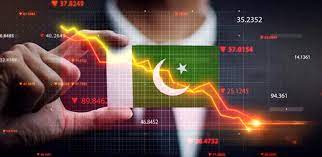
 Pakistan grapples with a myriad of challenges encompassing economic recession, elevated unemployment rates, and political tumult. The principal constituents contributing to Pakistan’s economic and societal affliction are the policies implemented by the Pakistan Democratic Movement coalition government, including exchange rate restrictions and import controls, coupled with the delays in the execution of the International Monetary Fund’s Extended Fund Facility program.
Pakistan grapples with a myriad of challenges encompassing economic recession, elevated unemployment rates, and political tumult. The principal constituents contributing to Pakistan’s economic and societal affliction are the policies implemented by the Pakistan Democratic Movement coalition government, including exchange rate restrictions and import controls, coupled with the delays in the execution of the International Monetary Fund’s Extended Fund Facility program.
The precipitous decline in economic expansion to -0.2 percent in the fiscal year 2023, contrasted with the robust 6.1 percent recorded in 2022, was chiefly attributable to the lethargic performance of both the industrial and service sectors. This recessionary trend was further compounded by a surge in unemployment, culminating in a historic pinnacle of 8.5 percent in 2023, surpassing the 6.2 percent threshold witnessed in 2021.
The interim administration precipitated by the removal of erstwhile Prime Minister Imran Khan has been ineffective in fostering economic equilibrium within the nation. Superfluous postponements of the 2024 electoral processes, compelled solely by judicial intervention, coupled with political subterfuge, have exacerbated both economic and political unpredictability.
The interim government achieved a noteworthy feat by adeptly brokering a successful negotiation with the International Monetary Fund (IMF) for a Stand-By Arrangement amounting to US$3 billion, thereby reinstating creditor confidence and bolstering support for external sector requirements. The IMF Executive Board, in its January 2024 session, granted approval for the disbursement of US$700 million, culminating in a cumulative total of US$1.9 billion.
The nascent administration shall henceforth be confronted with a myriad of formidable challenges. The new government’s economic rejuvenation agenda will face considerable obstacles due to fiscal imbalances, substantial debt repayments, and deficiencies in the balance of payments. Additionally, addressing mounting unemployment, particularly among the youth, and historically elevated inflation contributing to a notable surge in poverty is imperative for ensuring societal well-being.
A stable and effectively operating democratic system is essential for structural reforms and institutional restructuring. The government ought to adopt a strategy to overhaul its economic framework and attain a growth rate of 7–9 per cent in 2024. These actions would lay the groundwork for sustained long-term reforms.
The government ought to curtail extravagant spending across various sectors, including the 200 state-owned enterprises that incurred losses surpassing 500 billion rupees (US$1.8 billion) in 2020. It is imperative to enhance fiscal governance by establishing protocols governing public finance management to mitigate the burden of debt servicing costs, which have escalated to over 7.3 trillion rupees (US$2.5 trillion) in 2024. Subpar fiscal stewardship has led to insufficient allocation towards human capital development and other essential requisites.
The intricate tax structure necessitates streamlining through the reduction of superfluous documentation requisites, the diminution of compliance expenditures, and the enhancement of tax administration efficiency, thereby fostering incentives for economic activity.
The government ought to cultivate an equitable and competitive milieu to stimulate private sector investments, amplify productivity, and propel innovation and expansion. This entails mitigating the burdensome expenses incurred from the pervasive utilization of Non-Objection Certificates and assorted permitting prerequisites. The approximate yearly toll of bureaucratic entanglements on the economy stands at about 39 percent of GDP. This, in turn, dissuades investments and diminishes productivity, thereby constricting GDP growth.
Fostering gainful employment, particularly for the younger demographic, necessitates the facilitation of private sector involvement in industrious pursuits, while enabling heightened financial inclusivity and technological integration holds the key to unlocking Pakistan’s latent e-commerce capabilities.
The new government must prioritize the enhancement of the labor force’s quality through substantial investments in the cultivation of skills, education, healthcare, and mindset. Ensuring ubiquitous internet access and imparting advanced information and communication technology skills to the youth are imperative for Pakistan’s competitiveness on the global stage.
The imperative arises to reexamine the function of technical vocational institutions in order to align them with workforce demands. Concurrently, fortifying the labor market necessitates a recalibration of the social protection strategy, emphasizing graduation-based initiatives over the mere expansion of unconditional cash transfers.
In tandem with these initiatives, the new government must substitute its inefficient ‘bricks and mortar’ economic paradigm with a comprehensive model grounded in structural reform and market orientation. Although enacting reforms necessitates the expenditure of political and social capital, their enduring advantages for the nation significantly surpass these burdens. The nascent government must herald 2024 as a year dedicated to reform.






